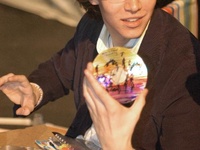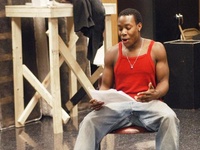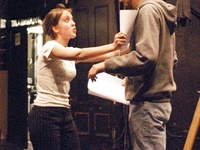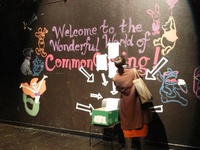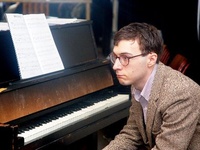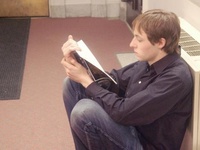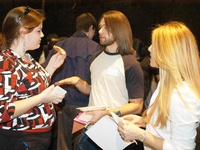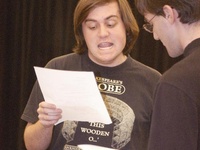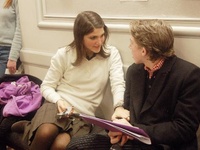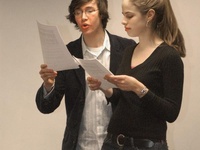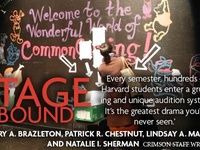Both Walleck and Martin have cast their net wide, trying out for eight or nine shows. They are hesitant to name particular parts they are gunning for, although it is clear that the Mainstage productions—"Knock" and "The Playboy of the Western World"—have caught their attention. Martin even requested a copy of the "Playboy" script in advance to familiarize himself with the plot, character motivations, and difficult Irish language that trips people up throughout auditions.
Martin and Walleck have been called back for everything for which they auditioned.
"I must have five overlapping auditions. It’s really annoying because I on purpose tried out for less shows," says Martin, who has described callbacks as "two days of hell."
"That said, it’s a good conflict to have," he adds.
The callbacks are more intense than auditions, with directors offering more feedback and direction, asking actors to run scenes multiple times. The hallway where people wait to enter the room already has a fatigued backstage feel.
"I love the way it works, but at the same time I don’t think it serves the best interests of the directors and the actors," Walleck says.
"As an artist you want to play at your top level, but after hour six you’re like, ‘what the hell can I show them that they haven’t seen yet?’" she adds.
Polk earns callbacks for all four of the shows for which he auditioned.
"I’m really excited for ‘Richard II,’" he says. "I’ve been called back for two pretty juicy things." The roles he reads for—Bollingbroke and York—share top billing with Richard.
At Winthrop House, where the Chicago callbacks are stationed, Kaszynski is being called back for the part of "The Emcee."
While Polk and Kaszynski scramble from the Loeb to their respective callbacks, Shafrin rushes elsewhere: his family. Unfortunately, a family emergency demands that Shafrin leave Cambridge immediately, preventing him from attending all but 30 minutes’ worth of callbacks.
Shafrin misses the sessions for "Knock," "Alice and Wonderland," and a much-sought-after spot in the Sunken Garden Children’s Theater’s show. He calls each director, explaining his situation and thanking them for understanding.
The Common Casting system—which crams all auditions into one week—may stop Shafrin from acting this semester.
THE ESSENTIAL PARADOX
Over 110 actors auditioned for "Chicago;" 49 have been called back for consideration for the final cast of 22. The actors called back are grouped by the part for which they are being considered. In the process, the actors become anonymous—"Get the Velmas in here!" Hanley yells. It’s as if, in this late stage of the game, the characters become more real than the actors.
Therein lies a shocking, but central paradox of any audition process: in the final stretch, the directors’ knowledge of the characters is tested far more than the actors’ abilities. The individual actors all can sing, dance, and act. What matters is the director’s vision—he has to know exactly who will make the best possible Roxie or Velma.
"That rare someone comes in and just is a part," he says. He explains that many final casting choices ultimately rely on the director’s intuitive sense of the characters: "She’s just got that little ‘erk’ that makes you think, ‘She could be a murderess,’" Hanley comments. Often the casting decisions are made right after auditions.









